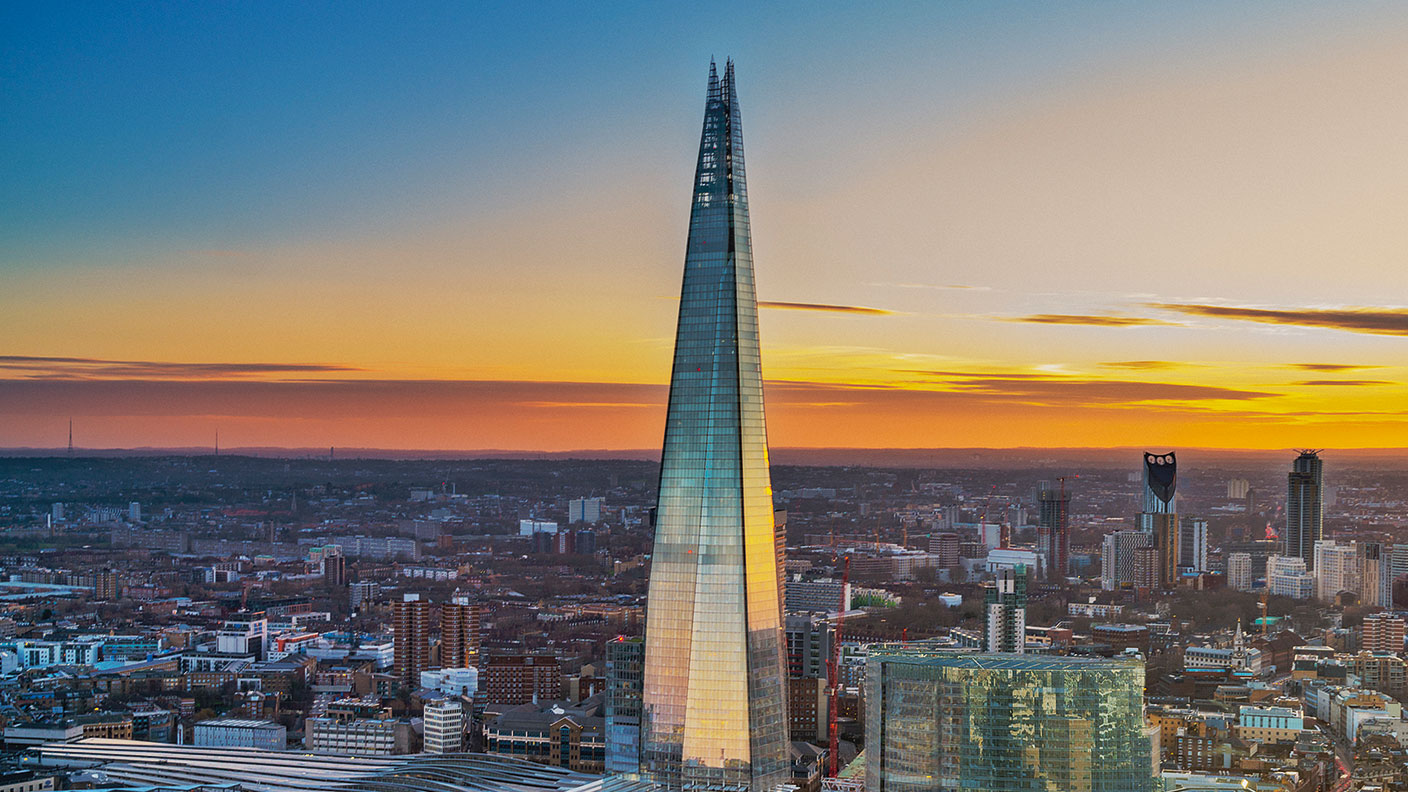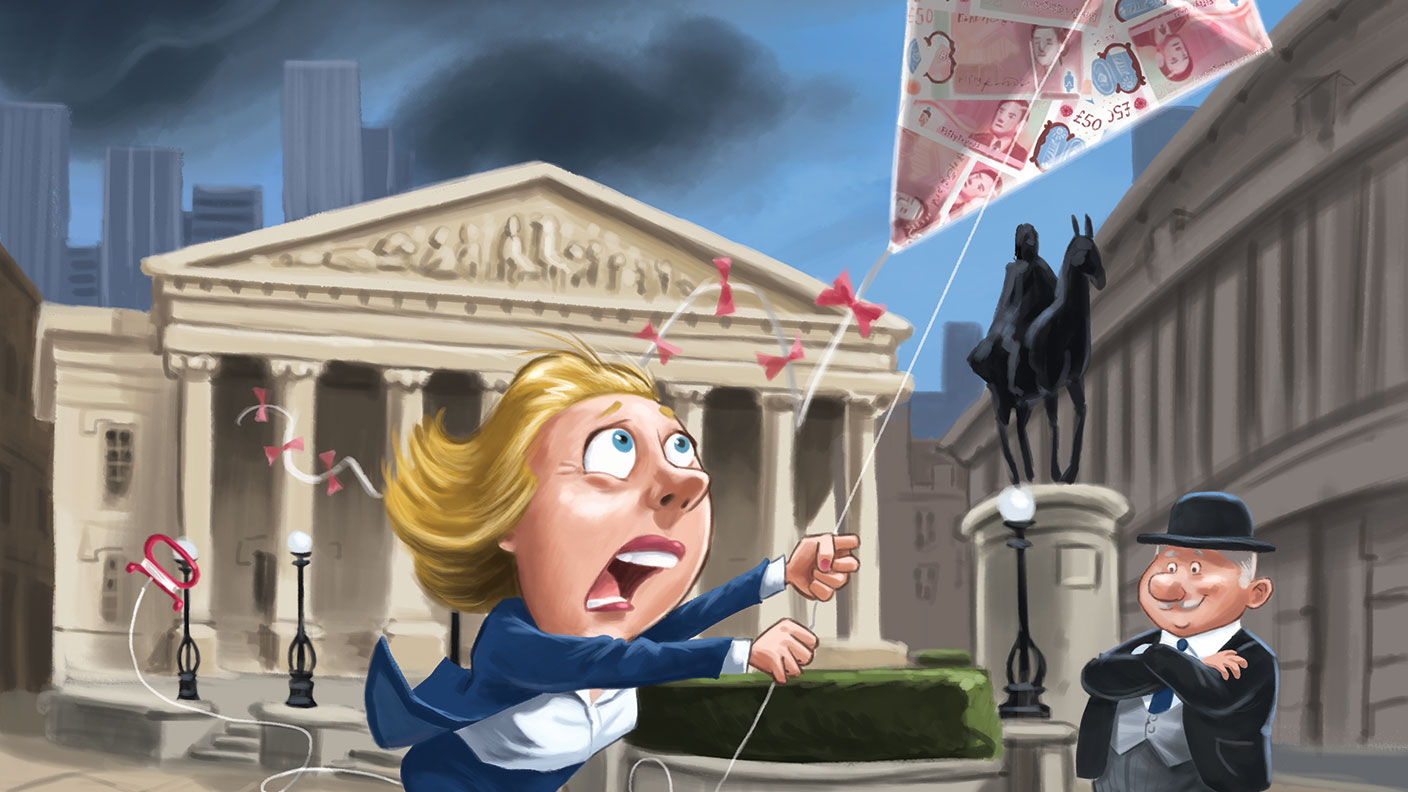Rich pickings for investors in Japan
The easy gains have been banked, but Japan has much further to go. Smart investors will hop along for the ride, says Merryn Somerset Webb.

Get the latest financial news, insights and expert analysis from our award-winning MoneyWeek team, to help you understand what really matters when it comes to your finances.
You are now subscribed
Your newsletter sign-up was successful
Want to add more newsletters?

Twice daily
MoneyWeek
Get the latest financial news, insights and expert analysis from our award-winning MoneyWeek team, to help you understand what really matters when it comes to your finances.

Four times a week
Look After My Bills
Sign up to our free money-saving newsletter, filled with the latest news and expert advice to help you find the best tips and deals for managing your bills. Start saving today!

I visited Japan a few weeks ago. Near the end of my trip I had supper with an old Japan hand. We had a drink on the 24th floor of the Peninsula Hotel. Not much local colour there. Then we went and ate grilled fish under the arches of the railway line. We sat next to the manager of a local bank branch. He wasn't happy. Why? Change.
Nothing, he said, was quite as it was. Particularly the women they no longer did as he said in the office and modern politics meant he couldn't make them. The more beer he drank the more upset he got. We felt for him. But we were pleased too: the ground shifting under his feet seemed to represent the change we saw in Japan.
Other impressions of it? Endless talk of rising wages and prices rather than deflation; bottles of water instead of labour-intensive cups of green tea in meetings; better executives and exciting-sounding entrepreneurial companies; old friends from my Tokyo days talking about buying flats; and, of course, the huge rise in the Japanese stock market since 2012 (up 62% since November).
MoneyWeek
Subscribe to MoneyWeek today and get your first six magazine issues absolutely FREE

Sign up to Money Morning
Don't miss the latest investment and personal finances news, market analysis, plus money-saving tips with our free twice-daily newsletter
Don't miss the latest investment and personal finances news, market analysis, plus money-saving tips with our free twice-daily newsletter
The changing face of Japan
So is there real change underway?If so, what's causing it? The answers are respectively "probably" and "hard to tell". Japan may have been on the verge of change anyway. Its banks are (unlike ours) finally fixed, so there is every reason for lending and confidence to rise. The tight labour supply is forcing a rise in participation and a change in attitudes: you have to be more polite to female staff if you need them to do more than make tea.
But on top, we have Abenomics the blend of monetary policy, fiscal policy and structural change that the prime minister, Shinzo Abe, is trying to push through to create inflation (the target is 2% by 2015) and growth after two decades of deflation and near-deflation.
It isn't all going swimmingly. Japan's GDP grew by just 1% annualised in the three months to the end of 2013, less than analysts had expected and Abe had hoped. Exports haven't been rising as fast as you might expect, given the weak yen (up 0.4% over the same period) and household spending was only up 0.5%.
Also irritating for Abe will be that, despite him putting huge amounts of pressure on corporations, wages haven't yet risen much. But most irritating of all given the emphasis placed on a rising stock market as a sign of success will be that the Japanese market has been, as SMBC Nikko's Jonathan Allum puts it, rather more "excitable" than most markets recently.
There have already been 12 days this year in which the Topix index has moved by more than 2% ("event days"). The market seems to be suffering from geopolitical anxiety to a greater extent than most: the Topix is now down 7% for the year.
But Abe and his Bank of Japan (BoJ) governor Haruhiko Kuroda have so far proved one very useful thing. Try hard enough and you can make inflation. Kuroda has printed 70bn and as a result core consumer inflation hit an annual rate of 1.3% in December. That's the fastest pace in three years.
The BoJ now reckons it is "almost on track" to hit its 2% target. Critics say this is all down to import price inflation caused by the weak yen (which has fallen as more and more money has been printed), an entirely reasonable interpretation.
However, Abe reckons that if you make prices rise, the rest should follow. Wages may not be soaring, but with inflation expectations among the Japanese firmly on the up and the labour market tight, Japan might be one of the few countries where workers will soon be able to exercise enough power to see their wages (and consumption abilities) rise. The jobs-to-applicants ratio is already above one and there are an amazing 3.74 jobs available for anyone looking for work in the construction industry, reports Nomura.
As a result all eyes are on the results of the shunto spring wage negotiations. Toyota, Honda and Toshiba have all given workers their first increases in base pay (rather than just bonuses) since 2008. These rises aren't big (Toyota has stumped up a mere 2,700 a month in extra base pay), but they are important (unlike bonuses, they can't be taken away next year).
Abe plans to coax even more women into the workplace. And there are hints that more growth-enhancing immigration will soon be allowed. But even so, with unemployment at just 3.7% (a rate that would push even Mark Carney to raise interest rates in the UK!), it is hard to see the labour supply growing enough to prevent further wage rises.
And if wages aren't hiked, Abe has a plan: he intends, says Allum, to "name and shame" the big firms that don't share the proceeds of fast-rising yen profits (as a result of the falling yen) with their long-suffering workers.
This is all good news the more inflation expectations and wages rise, the more likely the Japanese are to get spending (and investing in theirown stock market).
A property boom
The next piece of good news comes from the property market. In the end, says Ben McLannahan in the Financial Times, it may not be the promise of new casinos in Tokyo Bay (there's a plan to make Tokyo the new Macau), tiny wage increases, or a tax break or two that makes the Japanese feel more like spending.It might be the same thing that gets the British and the Americans out to the shops: "a rise in the value of the land under their feet".

Prices in Ginza (a wealthy Tokyo district) are much the same as in Mayfair (or more). But overall Japanese land prices have fallen pretty much every year since 1990. Last year, that began to change.
The massive dose of quantitative easing (QE) offered by Mr Kuroda has done what we now know it always does to real assets pushed their prices up. Land prices in the big cities started to rise last year. Data this week showed that for the first time since 2007 land prices actually rose in all three major cities in Japan (see chart).
It is hard to see that change losing momentum: banks remain determined to do more lending and "developers are still champing at the bit" well aware of the fabulous returns on offer if they can get enough workers to make it work think "yields ten times higher than their all-in cost of funding", notes McLannahan. This is one thing I heard over and over again when I was in Japan just how good yields on residential property are.
McLannahan reckons this will provide a "big psychological boost" to the Japanese consumer one that rising stock prices have so far failed to deliver. He could be right. In America a rise in the stock market is enough to bring on a wealth effect (whereby people feel richer and so go out and spend), but in Japan, where only 20% of the market is owned by retail investors, a rise in house prices is a better way to get the job done (rather as it is in Britain).
So Japan's a buy?
None of this necessarily makes Japan a buy. Two things really drive markets valuations and money flows. Long term, you need to buy a cheap market. But to make capital gains rather than just dividend income, you need other people to buy it too. In Japan you also have to chuck in one last thing the yen.
The stock market tends to track the currency. Yen up, market down. Yen down, market up. The last few weeks have been characterised by a strong yen (the yen is seen as a safe haven' currency), but we suspect that shouldn't be a long-term worry: over the year the BoJ is likely to keep "injecting massive liquidity", as the professionals put it (or printing money, as everyone else puts it), which should again depress the yen.
On to valuations. Last week one of the world's most-respected investors, Seth Klarman, said that many of the world's tech stocks trade at "nosebleed valuations" and that investors are "underplaying risk" in the US: "any year in which the S&P jumps by 32%... while corporate earnings barely increase should be a cause for concern".That concern doesn't really exist in Japan.
Valuations aren't at the rock-bottom levels we saw a few years ago, but they aren't high either. Earnings are rising nicely with margins low and operating leverage high (ie, a small rise in sales means a big rise in profits), it doesn't take much to push profits up in Japan.
With the market on an average price-to-book ratio of around 1.5, you get better value from stocks in Japan than in most of the rest of the world. But according to Simon Barrows at Daiwa Capital, the real game-changer could be if Japanese companies boost returns to shareholders. Return on equity is 8.9% in Japan, versus 15.9% in the US.
Companies are "awash with cash and it is no longer so politically acceptable to just build this forever we expect increasing returns to shareholders, and the starting point is so dismally low this trend can be sustained for a decade".
A coming boost for stocks
Then liquidity. Japan had a great year last year, but now global investment tourists are bored of it they bought 15trn of Japanese stocks last year and have sold 1.3trn so far this year. But there's plenty of money elsewhere.
First up are Japan's huge (second-largest in the world after the US) pension funds. They're almost ridiculously conservative some 58% of Government Pension Investment Funds' (GPIF) assets are in domestic bonds, and only 16% in domestic equities. A government panel reviewed this last year.
The idea is to raise the equity weighting (to 20%). That might not sound huge, but it could be. Andrew Smithers of Smithers & Co notes that the market capitalisation of the Tokyo stock market is around 460trn. The assets of the GPIF are around 216trn. So just "a 1% shift into equities would require purchases equal to 0.27% of the stock market".
Beyond this, there is hope that domestic buyers will buy in independently. In 1949 individuals owned 70% of the Japanese stock market. Today, it is not much more than 20%.
According to Japan fund manager Scott McGlashan, "there is $100,000 in cash sitting in bank accounts for every man, woman and child in Japan, paying 0.25% for a three-year deposit". That's a pathetic rate (even to those of us getting used to UK rates).
So as inflation returns, he thinks people will be pushed into equities where dividends are rising (the yield on the Topix is currently 1.76%). This coincides with the launch of the Nippon Individual Savings Account (Nisa), a tax-free savings account rather like our own Isas. Look at the stocks bought through Nisas in their first month and high dividend-payers loom large.
If nothing else gets the Japanese investing, the idea that they won't be getting a real yield on their cash (with deposit rates at 0.25%, inflation at 1.3% means you lose out) eventually will.
More QE is on the cards
This brings us to the biggest driver of liquidity of all QE. The jury is still out on how QE in America and Britain might or might not have affected the real economy. But we know for sure that it has pushed up the price of real assets (mostly stocks and property). It is likely to do the same in Japan, and we can be pretty sure, says Chris Wood of specialist Asian broker CLSA, of "a second QE blast from Kuroda during 2014".
Given that the BoJ is already buying about 70% of newly issued Japanese Government Bonds (JGBs) this fiscal year, "any further BoJ action is likely to lead to purchases beyond JGBs, such as J-Reits and ETFs" (real-estate investment trusts and exchange-traded funds). That will boost the market even more.
How can we be sure of more QE? Because "the stock market is a key target of Abenomics", says Wood. "If it keeps falling doubts will be raised about the success of Abenomics." Abe's support peaked at 76% in April 2013, with the market. It is now 56% he will want to ensure it falls no further, a good incentive to keep the market up.
Japan has many doubters (see below and many observers don't think Abe's third arrow (structural reforms) will come to fruition. We suspect they are wrong. But even if it comes, structural change is a slow business.
For now, the BoJ's policies remain the main game in town. Buying Japan is not the one-way bet it was a few years ago the easy gains from ultra-cheap valuations and shock-and-awe QE have been banked.
But with reasonable valuations, the potential for a wave of new domestic money to enter the market, and the near-certainty of more QE after the rise in the sales tax in April, we are still buyers. Japan's new leaders are, as Albert Edwards of Socit Gnrale says, "absolutely committed" to their cause (printing money untilthey get inflation). Why not be along for the ride?
What are the risks?
Being keen on Japan's stock market in the medium term, as we are, isn't the same as thinking that the country's future will be crisis-free. It won't be. The obvious thing to worry about, if you are so minded, is a new financial meltdown.
Socit Gnrale's Albert Edwards is convinced that Japan will lead the way into the next global crisis by "losing control of QE", due to the "precarious arithmetic" involved in stepping up money printing enough to keep bond yields down even as "inflation pours like a soothing balm" over Japan's shockingly awful public finances. Think inflation at 40%.
That's just the start. This year, Asia broker CLSA published a book, Japan in Peril? It suggests the Fukushima nuclear disaster shows that modern Japan is useless at reacting to crises, and lists nine other crises that it might respond badly to in the future. It is depressing stuff.
There is the island dispute with China. How would Japan deal with "all-out combat"? Not very well, it seems. Next up is an earthquake in Tokyo seismic experts estimate a 70% chance of a "big one" in the next 30 years. Given past form, says CLSA, this would be a "national catastrophe".
Then there is the shrinking population, which threatens Japan's "conventional social family and conjugal values" and could lead to generational "war". After that come cyber terrorism, nuclear terrorism (there have already been threats), a medical pandemic and the possible collapse of North Korea.
I wouldn't worry too much these kind of things aren't predictable. The main worry, though, is Edwards': Japan is likely to end up monetising much of its vast public debt with QE. The long-term effects could be nasty.
The trusts and funds to buy now

If you're a long-time MoneyWeek reader you may well already have some exposure to Japan, writes John Stepek. But if you're yet to buy in, the easiest route is via a fund of some sort.
Among our favourites (and among the top performers) have been Baillie Gifford's Japan investment trusts the BG Shin Nippon investment trust (LSE: BGS) (Merryn Somerset Webb is a non-executive director on this trust) and the BG Japan trust (LSE: BGFD).
Shin Nippon is up 93% in the past three years, while BG Japan is up 72%. However, both trade at premia to their net asset values (6.7% and 0.7% respectively) and we hate buying trusts at premia, so wait until they get a little less expensive.
If you prefer unit trusts to investment trusts, the Legg Mason Japan Equity fundhas done fantastically well, more than doubling in the last three years.As a small-cap growth fund, it is very volatile, and quite an aggressive bet on Japan. Another top performer (up 42% over three years) is CF Ruffer Japanese Fund.
This is a more wide-ranging fund and the manager, Kentaro Nishida, has the ability to hedge the currency as he sees fit. This adds a layer of risk (if you hedge at the wrong time, you'll damage rather than enhance returns), but given the fund's solid performance so far, he seems to be managing hedging well.
One to watch out for is the imminent launch of JO Hambro Capital Management's Japanese Dividend Growth fund, run by Scott McGlashan and Ruth Nash. As the name suggests, it will focus on stocks paying decent dividends, or with the scope for decent dividend growth. And for cheap, simple exposure, try Vanguard's FTSE Japan (LSE: VJPN) exchange-traded fund, with a total expense ratio of just 0.2%.
Get the latest financial news, insights and expert analysis from our award-winning MoneyWeek team, to help you understand what really matters when it comes to your finances.

-
 New PM Sanae Takaichi has a mandate and a plan to boost Japan's economy
New PM Sanae Takaichi has a mandate and a plan to boost Japan's economyOpinion Markets applauded new prime minister Sanae Takaichi’s victory – and Japan's economy and stockmarket have further to climb, says Merryn Somerset Webb
-
 Plan 2 student loans: a tax on aspiration?
Plan 2 student loans: a tax on aspiration?The Plan 2 student loan system is not only unfair, but introduces perverse incentives that act as a brake on growth and productivity. Change is overdue, says Simon Wilson
-
 Governments will sink in a world drowning in debt
Governments will sink in a world drowning in debtCover Story Rising interest rates and soaring inflation will leave many governments with unsustainable debts. Get set for a wave of sovereign defaults, says Jonathan Compton.
-
 Why Australia’s luck is set to run out
Why Australia’s luck is set to run outCover Story A low-quality election campaign in Australia has produced a government with no clear strategy. That’s bad news in an increasingly difficult geopolitical environment, says Philip Pilkington
-
 Why new technology is the future of the construction industry
Why new technology is the future of the construction industryCover Story The construction industry faces many challenges. New technologies from augmented reality and digitisation to exoskeletons and robotics can help solve them. Matthew Partridge reports.
-
 UBI which was once unthinkable is being rolled out around the world. What's going on?
UBI which was once unthinkable is being rolled out around the world. What's going on?Cover Story Universal basic income, the idea that everyone should be paid a liveable income by the state, no strings attached, was once for the birds. Now it seems it’s on the brink of being rolled out, says Stuart Watkins.
-
 Inflation is here to stay: it’s time to protect your portfolio
Inflation is here to stay: it’s time to protect your portfolioCover Story Unlike in 2008, widespread money printing and government spending are pushing up prices. Central banks can’t raise interest rates because the world can’t afford it, says John Stepek. Here’s what happens next
-
 Will Biden’s stimulus package fuel global inflation – and how can you protect your wealth?
Will Biden’s stimulus package fuel global inflation – and how can you protect your wealth?Cover Story Joe Biden’s latest stimulus package threatens to fuel inflation around the globe. What should investors do?
-
 What the race for the White House means for your money
What the race for the White House means for your moneyCover Story American voters are about to decide whether Donald Trump or Joe Biden will take the oath of office on 20 January. Matthew Partridge explains how various election scenarios could affect your portfolio.
-
 What’s worse: monopoly power or government intervention?
What’s worse: monopoly power or government intervention?Cover Story Politicians of all stripes increasingly agree with Karl Marx on one point – that monopolies are an inevitable consequence of free-market capitalism, and must be broken up. Are they right? Stuart Watkins isn’t so sure.